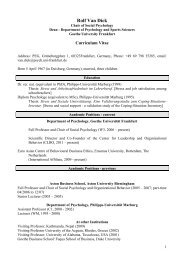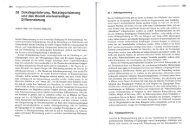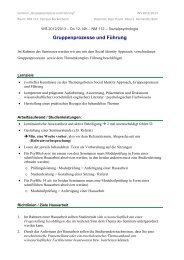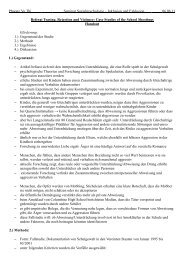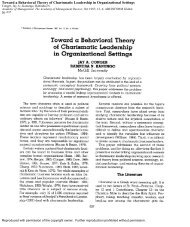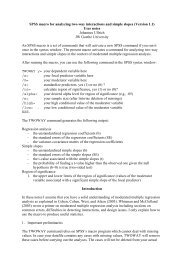Leadership-Interview-Transkript - Sozialpsychologie - Goethe ...
Leadership-Interview-Transkript - Sozialpsychologie - Goethe ...
Leadership-Interview-Transkript - Sozialpsychologie - Goethe ...
Erfolgreiche ePaper selbst erstellen
Machen Sie aus Ihren PDF Publikationen ein blätterbares Flipbook mit unserer einzigartigen Google optimierten e-Paper Software.
know, growing up, we had a small business. And if you own a small business, if you don’t<br />
work – you don’t make any money. I got used to work seven days a week. I got myself<br />
through college and then worked there full time after graduation. I routinely worked seven<br />
days a week throughout all the year. Whenever a client wanted to record at the studio, I would<br />
be there. And most musicians like to record at night! So I would be there until the end of the<br />
day. I think another thing that becomes really important from a leadership standpoint is the<br />
idea of self-confidence and self-efficacy. Cause a lot of times you’ll have to be confident in<br />
yourself, and then you have to convince other people to be confident as well. That’s a real<br />
challenge. For whatever reason, they were able to impart to me this idea that I was extremely<br />
confident, even in the absence of direct evidence that I should be so confident. There is some<br />
kind of functional value from a leadership standpoint from being really, really confident in<br />
yourself, because you often have to take risks, and you often have to espouse a vision that<br />
people can see. If you express that confidence in what you do, then other people begin to<br />
believe you. And then, a third thing that they really helped me to understand is the idea of<br />
being independent and being entrepreneurial. Having a small business is a challenge, and I<br />
think that served me well again. I think part of the leadership part is to have that confidence in<br />
your own independent voice. And to be able to, when bad things are happening, to be able to<br />
say ‘now, this is really what we should do’ and to be able to stand on your ground. Integrity<br />
and trust, those are key attributes to be a good leader.<br />
Rolf van Dick: I mean, what you described sounds like the family business and your parents<br />
had to strive surviving in this business, but it also seems related to what you need as a<br />
researcher, you need – or you do have a lot of autonomy, flexibility, you need to be<br />
entrepreneurial, think about topics and you have to be hard working, of course. But would it<br />
have equally suited you for a career, say, in a more bureaucratic organization, like in military<br />
or civil service somewhere?<br />
Frederick Morgeson: I think, maybe not in some highly bureaucratic organizations. Surely,<br />
the work ethic and the self-confidence part, but not so surely the entrepreneurial and the<br />
independence is what a lot of big organizations are looking for. Some are, of course, because<br />
there are businesses about creating and innovation. So I think, one of the things I tell my<br />
MBA students when I teach them is that you have to find, what your own unique sort of<br />
leadership story is, and then o be able to articulate that. And then you’ll find the fit between<br />
who you are, so you have to have some knowledge of who you are, but also what the<br />
organization is. And to seek to find organizations that fit your own personal value system and<br />
your own strengths. I work at university, which is a very bureaucratic organization, but in a<br />
way that I can still be isolated from that kind of bureaucracy.<br />
Rolf van Dick: Do you think in your context or in other contexts, there are specific times,<br />
circumstances, situations, when leadership is needed more than in others?<br />
Frederick Morgeson: Yeah, I think leadership is needed in times of crisis. I think leadership<br />
is needed when there’s change. But the challenge is, that if you’re very successful, you’re the<br />
least likely to change. And this is true for organizations. So, one statistic that I like is how<br />
many fortune 100 companies stay on the list over time, and one analysis suggested – over a 20<br />
year period – only about 30 of the 100 companies stayed on the list of the largest 100<br />
companies of the world, suggested that with 70 companies, something somehow happened!<br />
You’re in an environment that’s dynamic, and you need to be constantly adapting to that<br />
environment. And then, most organizations don’t. I think you become a victim of your own<br />
success, right? You’re not able to see that things are changing or if you see it you’re not able<br />
to give up that source of your strength.








